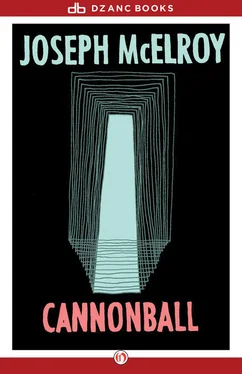Joseph McElroy - Cannonball
Здесь есть возможность читать онлайн «Joseph McElroy - Cannonball» весь текст электронной книги совершенно бесплатно (целиком полную версию без сокращений). В некоторых случаях можно слушать аудио, скачать через торрент в формате fb2 и присутствует краткое содержание. Год выпуска: 2013, Издательство: Dzanc Books, Жанр: Современная проза, на английском языке. Описание произведения, (предисловие) а так же отзывы посетителей доступны на портале библиотеки ЛибКат.
- Название:Cannonball
- Автор:
- Издательство:Dzanc Books
- Жанр:
- Год:2013
- ISBN:нет данных
- Рейтинг книги:5 / 5. Голосов: 1
-
Избранное:Добавить в избранное
- Отзывы:
-
Ваша оценка:
- 100
- 1
- 2
- 3
- 4
- 5
Cannonball: краткое содержание, описание и аннотация
Предлагаем к чтению аннотацию, описание, краткое содержание или предисловие (зависит от того, что написал сам автор книги «Cannonball»). Если вы не нашли необходимую информацию о книге — напишите в комментариях, мы постараемся отыскать её.
continues in McElroy's tradition of intricately woven story lines and extreme care regarding the placement of each and every word. A novel where the sentences matter as much as the overall story.
Cannonball — читать онлайн бесплатно полную книгу (весь текст) целиком
Ниже представлен текст книги, разбитый по страницам. Система сохранения места последней прочитанной страницы, позволяет с удобством читать онлайн бесплатно книгу «Cannonball», без необходимости каждый раз заново искать на чём Вы остановились. Поставьте закладку, и сможете в любой момент перейти на страницу, на которой закончили чтение.
Интервал:
Закладка:
That palace dive answers her nine thousand miles and counting months and months later though what had I for answer wrecked at the brink of a now wartime palace pool, too slow to get the micro out for a still, though v-c recorded from the hip? For a spy without knowing it, of what wretched use am I it comes to me like my body itself during the later Hearings? And he this once upon a time huge figure yet not quite of fun, a gigantic kid you could trifle with not at all at your peril, unless privately in your heart and his; a promise at the edge of my neighborhoods so unforgettable I couldn’t always hang with it, like my sister’s word for his entry, “farewell” (then “frequent farewell,” this being my sister) — he was an untouchable diver I only later far away at my own paid picture-taking understood — too late? — and had been a sort of friend before even the cannonball beginning. For what else could I make of the word Cheeky (her name) said to me at the moment of the breaker going by the old woman in blue jeans and the Australian hat, who perhaps a year and a half before had taken the snapshot of Umo on the gangway in Vera Cruz with his enlarged hand out in welcome or arrest?
How long had they all known me even two weeks before Thanksgiving when I all but ran into Umo, how could I not have seen him stepping down out of the Heartmobile? — and it was as if we knew each other pretty well even then. It was my birthday, I’d bought one of The Inventor’s special envelopes and, recalling the potency of an earlier one, I’d been quite absorbed in whether or not to open it and I’d wound up downtown across from the Coaster train station. But now Umo must stop at the recruiters table, flag-deco clipboard, pamphlets of the future spread out where music stampeded blindly somewhere under the table and the two Marines speechless behind grim smiling teeth; Umo asking if this would get him citizenship. You could take him for seventeen. An unusual person maybe. Was it experience? He would need to lose some pounds, said the corporal, not really answering Umo’s question. “Shed some weight,” said the sergeant. Umo pointed under the table at the pint-size speaker. “That’s what they gonna listen to over there.” Later I grasped the quality Umo gave to his speech when he opened his mouth — or it could feel like it was coming true anyhow and I was on home ground but it made me mad. “Over there?” said the sergeant, alarmed. “Rock,” said the corporal “It’s not going to be ‘Onward Christian Soldiers,’” I said. “Not on a daily basis,” said the sergeant frowning, smiling, pushing a piece of paper toward me. “Help ’em shoot straight,” said the corporal. “He’s with you guys, though,” I said. “All the way,” the corporal said. “A peacemaker,” I said. “Hey, He was a Marine,” said corporal.
I asked him what would happen and he said it wasn’t up to him but we were always ready. “ Who’s a Marine?” said Umo so quick always though never what you would call quick (though I wished he would pick these guys up and throw them like endover-end grenades into the middle of the lake, a dumb thought of mine that brought with it Jesus out on the water for the day — prepared was what he was — marine Jesus had come to me). “Well, Jesus,” I said, “he’s our C.O.” “C.O.?” “C. E .O.,” I added.
“C E O?” What did Umo miss? Not much in my voice. “He gives us a hundred and ten percent,” I said. The Marines stared. What made me unreal, these words? Why would any kid need to enlist? My foresight weighed me in, shutting me down. The sergeant, extremely low-body-fat, looked over his shoulder at three kids behind him. (“They high school?” he said.)
“He had something going for him,” I said. “Those fishermen just left their nets and followed him. Talk about miracles.” “Secret weapon,” I remember Umo said.
It was my birthday sort of self-anointed, though I kept it to myself when I said I would take him to the East Lake club to a practice. Umo looked at his watch. He understood I now think as much as I, or anyway he was seriously touched, but was ready. “CEO?” I said. Chief Executive Officer, though the Jesus may have lost him. “I like to see what we talk about.” That meant, we talked. I got us onto the East Lake bus. I saw something out the bus window. The three (I was pretty sure) middle-schoolers were collecting literature from the recruiters and it looked like ballpoints to sign their names with to and to keep. I was taking Umo over to East Hill to have a look at a practice and get his feet wet. “About Jesus,” I began again—“It is not what we believe,” Umo said. “—some say he was proactive,” I said, “that was the thing about him, getting things done on all fronts.” “That is your business,” I recall Umo said. “You get it,” I said, “and if you don’t get it yourself you can’t tell someone else.”
“So what are you doing?” Umo laughed like he might not agree, and the bus driver had us in his mirror. I was sorry for Umo and it came out wrong. I said my sister would agree with Umo. It was my birthday, I said. “Hey, your birthday, what’s up?” “East Hill.” “What else?” Well, my sister was cooking dinner.
I feared I had invited Umo but he said, East Hill, good. Or did he think we lived there? “Your sister,” he said, and nodded with enthusiasm or formality. I was sorry for him maybe.
Did I have a look on my face? Jesus had meant business, I said, he had capitalized on what he had going for him, he had a job to do, I said. Umo gave me a look. Not did I believe all that, but. I let my face not say to him Yes or No, I think.
“You so…” Umo, pausing to not find the word, was momentarily older. He knew it was something to not quite find the word you wanted. He was learning. Even kids, I said wryly, should enlist with Jesus, that’s what he said, “come unto me,” as I recalled. It was almost new to me, what I found myself saying, as if my sister and I were up in her room kidding around and talking in our private little family way a job within a job and treating each other right.
“I’m so…so what?” I said, wondering again what was the secret weapon.
“So plenty,” Umo said, and laughed, and the bus driver had us in his mirror. And listen, the old cowboy Umo’d given a dollar to (he hitched his thumb) that’s not begging. He was doing his job. “Two dollars,” I said. We sort of laughed. “You knew about East Lake and my father,” I said. “Yeh, I don’t say I know someone already when I meet them. They don’t like it.” That was right, I said, thinking my sister would have something great to say and then I imagined she got on our bus, her hair tied back, just before the doors unfolded shut; and I smelt the aqueous echoing of the pool we were traveling to, and felt an elbow lifting out of the water we hadn’t arrived at yet and someone’s arm reaching. Umo was looking past me, which he didn’t do, but not out the window at the girls with little backpacks, but somewhere; and I remembered the envelope I had given The Inventor ten dollars for for my discounted birthday.
Umo, maybe he wasn’t used to the city by bus, a system the envy of L.A. He was a trucker, with or without a license, a kid also. On the spur of the moment deciding to mention The Inventor by his surname, I said he knew all these languages. Had Umo known him long? The bus came to a stop and Umo looked around him and I thought he would get off. We were getting near our stop and Umo was looking out for it like he knew where it was. Inventor knew many languages, I said, that’s what we called him, The Inventor. Umo said, Oh yeah. He was paying attention to me somehow.
“Urdu for one (which really says it all),” I said, a bait Umo didn’t take (and who was to say The Inventor was Pakistani because he knew Pakistani jokes?)—“and because of Urdu some Middle Eastern. And French.” Had Umo known The Inventor long? Yes: long time — and Parsee he knows, I said, distracted. (But how long could he have known him? I thought.) “And he knows Hindi, some of those Indian languages — Dravidian, I think.” I didn’t know what I was talking about, I said.
Читать дальшеИнтервал:
Закладка:
Похожие книги на «Cannonball»
Представляем Вашему вниманию похожие книги на «Cannonball» списком для выбора. Мы отобрали схожую по названию и смыслу литературу в надежде предоставить читателям больше вариантов отыскать новые, интересные, ещё непрочитанные произведения.
Обсуждение, отзывы о книге «Cannonball» и просто собственные мнения читателей. Оставьте ваши комментарии, напишите, что Вы думаете о произведении, его смысле или главных героях. Укажите что конкретно понравилось, а что нет, и почему Вы так считаете.












